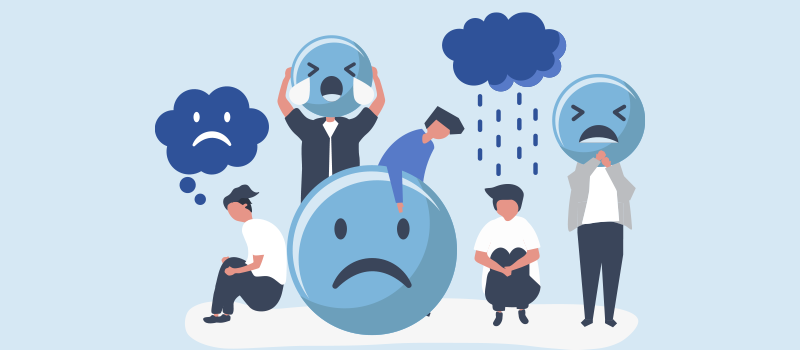Mental Illness: The Boy Who Cried Wolf
Mental illness has the capacity to affect anyone, and sometimes its effects are not immediately apparent.
Have you ever heard the story of the boy who cried wolf? Having lied about seeing a wolf, he tricked the villagers into worrying about him. A few days later, however, he truly did see a wolf. But no villagers came to his assistance, assuming that the boy was lying once again..
Joking about mental illness sets the stage for this to occur in real life.
As a teenager growing up, it’s not uncommon to hear jokes and misguided statements about depression, ADHD, or OCD flippantly exchanged during daily conversations between students. In the past few years, discourse about mental health issues has become more commonplace. While the awareness is positive in that it makes it easier for people to seek help for their mental struggles, people often fail to recognize that with the persistent deterioration of mental health in the U.S. today, lightly throwing around language such as “depression” and “anxiety” to describe minor inconveniences can have dangerous consequences.
When COVID-19 hit and remote learning was introduced as the world was sent into lockdown, many, including myself, found that school became easier. Teachers graded more lightly, less homework was assigned, and the lack of after-school activities freed a significant amount of time in many students’ schedules. However, when the pandemic began to recede, and students slowly made their way back to school for in-person learning, it was a shock to the system. The academic workload suddenly became more rigorous. Dr. Lia, one of Greeley’s psychologists, explains that “the abrupt change in workload and stress may have led students to arbitrarily throw around phrases relating to mental illnesses they didn’t understand the full extent of, or that they didn’t really mean as a way of expressing themselves. ”
It took me a while to realize the depth of the problem. Hearing phrases like “I’m so depressed” and “I can’t focus, I must have ADHD” became more frequent in my life around middle school, but I didn’t understand how much weight they carried until I entered high school. It was at that time that I became exposed to the true nature of depression and anxiety as I saw some of my peers begin to grapple with mental illnesses and their exhausting symptoms. Soon, the phrases were no longer laughable, meaningless words.
The discussion of mental illnesses has undoubtedly helped to destigmatize and bring visibility to those suffering. However, the trivial comments on mental illnesses have cultivated a harmful culture that can unintentionally hurt people experiencing symptoms. Senior Jamie Lynch says “‘This is giving me depression’ or ‘It is triggering my OCD,’ are two common phrases that I hear a lot. If this is the standard [that is] being set about what constitutes a mental illness, it only fuels more societal misunderstandings on the topic.”
Behavior like this can lead to psychological terminology losing its substance and true meaning; those suffering from disorders may not be taken as seriously as they should be. While there is a spectrum regarding the severity of many mental illnesses, there is an obvious distinction between someone with a mild case of depression and someone who simply throws the word around.
As a society, we should aim to marginalize the shame associated with mental illnesses, while emphasizing the burden that patients carry, especially during a time that the World Health Organization calls a worldwide “mental health crisis.” Since the pandemic, the World Health Organization reports that there has been a spike in mental health issues as well as symptoms of depression and anxiety.
With the prevalence of mental illnesses today, casually proclaiming that you’ll take extreme measures, such as taking your own life due to a minor inconvenience, risks undermining the weight of what people with suicidal ideations deal with. Joking about an illness should be kept at a minimum out of respect for others. You never know if a person in your vicinity is dealing with a mental illness or is at a volatile time in their life. Even using these words lightly can reinforce unhealthy messages that mental illnesses are not worthy of medical attention and that the experiences of people with suicidal ideations can be taken lightly.
There’s a duality to the normalization of mental illnesses: On one hand, regularizing discussions surrounding mental illnesses encourages people to speak up about their struggles and seek a diagnosis if needed. However, an important distinction must be made between having conversations about mental illnesses and flippantly using the terms. It’s time to start being more mindful of our language because it matters – and its impact can be immeasurable. Although it may seem like a small thing to do, it can make a world of difference for those around you.








